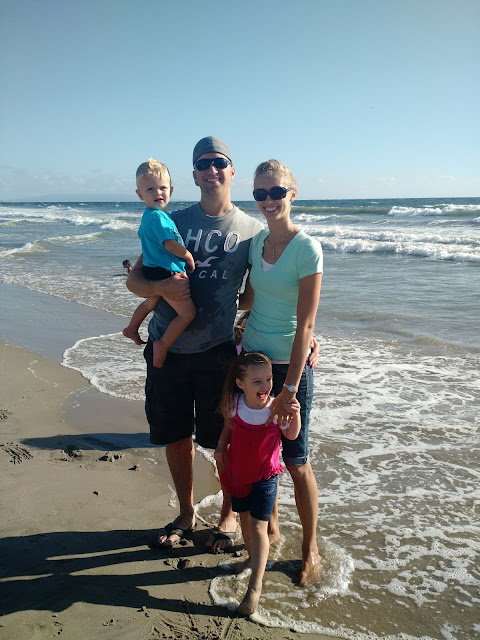Here we are two years later and my son is now almost the same age as my daughter was when we first started looking at disciplining methods. The only difference is that now we've had a little practice so it's not as big of a challenge when we're faced with the same tantrums. *wink*
So I'm going to let you in on the one thing that has made the biggest difference for us in the way we discipline our kids: follow through.
Before I talk a little more about this, let me take you through the typical process I use when I'm faced with my child acting in a way that isn't ok.
Example:
My daughter is choosing to pick a fight with her brother over a toy that is his and that he was playing with first.
My actions: Watch to see if they are able to resolve it without me getting involved. If so, no further action is needed. If not, I give my daughter her first warning.
My daughter continues to fight with her brother.
My actions: Watch for a moment to see if they resolve it. If not, I give my daughter a second warning.
My daughter is still fighting with her brother about they toy and pushes him.
My actions: Give my daughter her final warning and tell her she needs to go to time out.
She walks over to time out but does not sit in time out.
My actions: I tell her to sit in time out or I will be adding time to how long she needs to be there.
She doesn't sit in time out and continues to try and argue why she doesn't want to go to time out.
My actions: I add time to her time out and continue to add time until she chooses to get in time out. Then I start the timer and do not interact with her until the timer goes off. When the timer goes off, she comes to talk to me about why she was in time out and why time had to be added. The time for discipline is over and she can continue playing.
If the same thing were to happen when my husband was home, he would follow the same steps. You could also think about it as being consistent. Obviously, it would be impossible to be consistent all the time, but I'd like to think we do this at least 80% of the time.
*Note: In case you're interested in the specifics of the method we've chosen to help us discipline our kids, you can check out the book 1-2-3 Magic. We've tweaked it a little for our family, but the basics are all there.
Another aspect of following through is asking yourself this question: If my child misbehaves and I give them the consequence for their actions, am I willing to follow through with it?
I remember the week before we went to Disneyland, my daughter was acting a little extra naughty. As much as I wanted to say, "If you don't act nicely, we're not going to Disneyland", was I really going to follow through with that? No. So that's when I had to rethink the consequence for her actions to something more appropriate to her behavior and something that I would actually follow through with.
As parents, we have to be committed to doing what we say we are going to do. If we don't, our kids will learn that they can act badly and not expect any consequences. So if you are on your way to get ice cream and your kids are fighting on the way and you tell them they need to stop or you'll turn around and go home, you better be sure that's what you're willing to do (even though you totally deserve that ice cream!). If you tell your child they have to finish their chores or they don't get to play with their friend, you have to follow through no matter what. If our kids misbehave and we say there is going to be a consequence, they know it's not an empty threat. (Obviously, I am assuming that none of you are abusing your children and that you are using constructive forms of discipline.)
When we are consistent in our parenting, it teaches our children that they are safe and secure with us. They know we'll follow through on the good stuff as well as the not so good. It builds a strong foundation of trust and our children will know that we are there for them when life gets hard. When we discipline our children, we show them that we love them because we're teaching them how to keep commitments, to be responsible, be accountable for their actions and learn the difference between right and wrong. And as parents, isn't that what we want for our children?
What helps you be consistent in your parenting?






















No comments